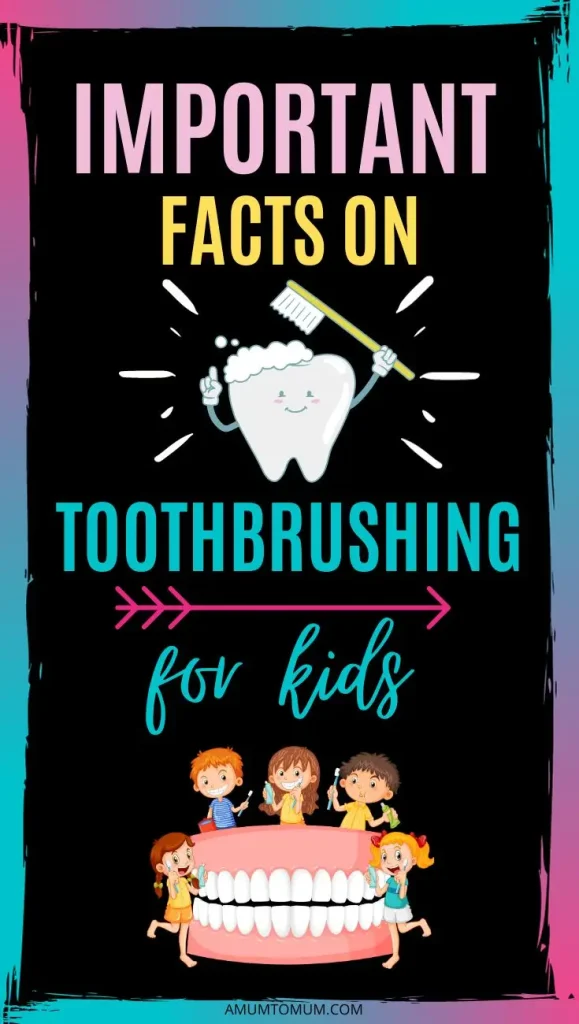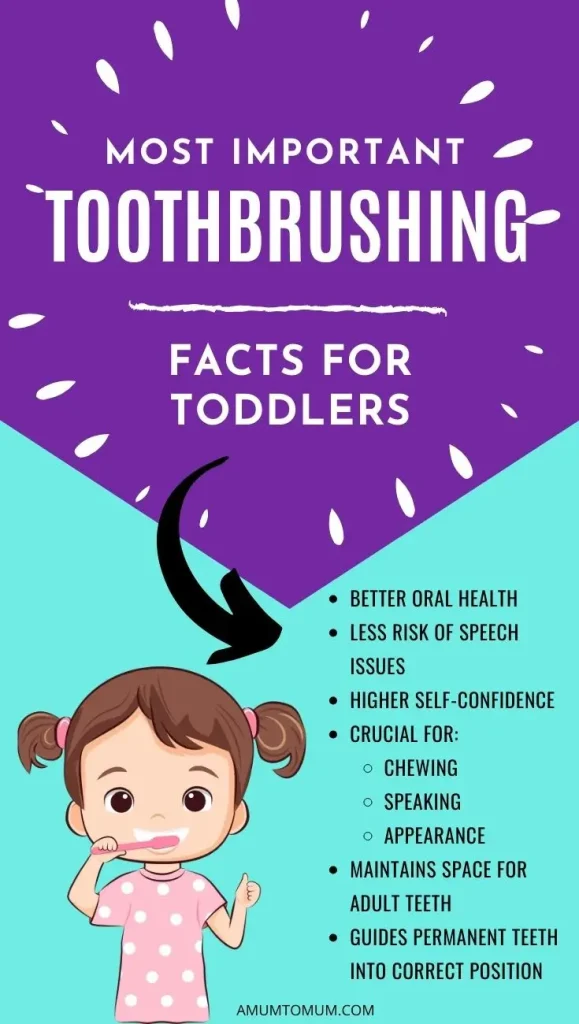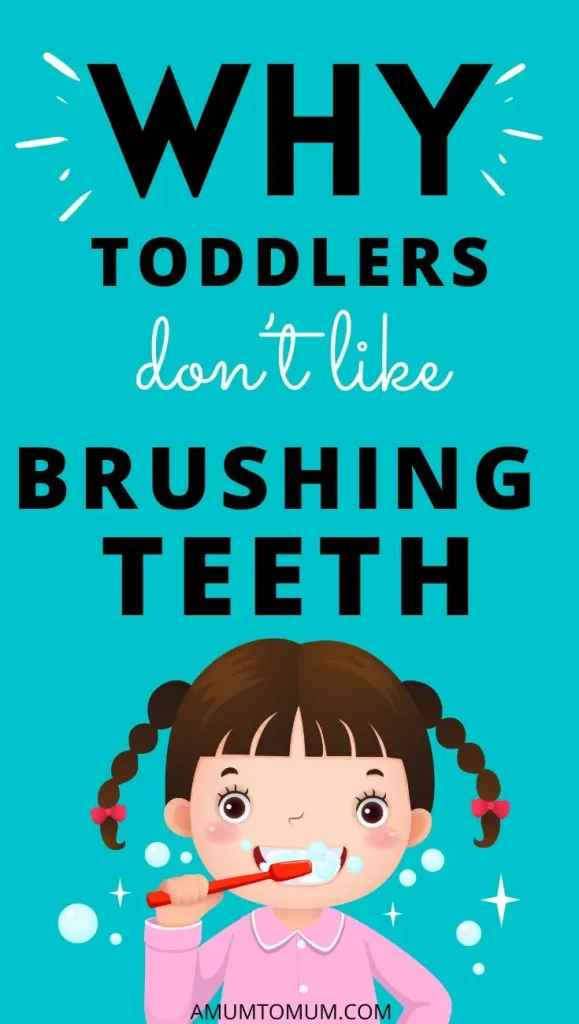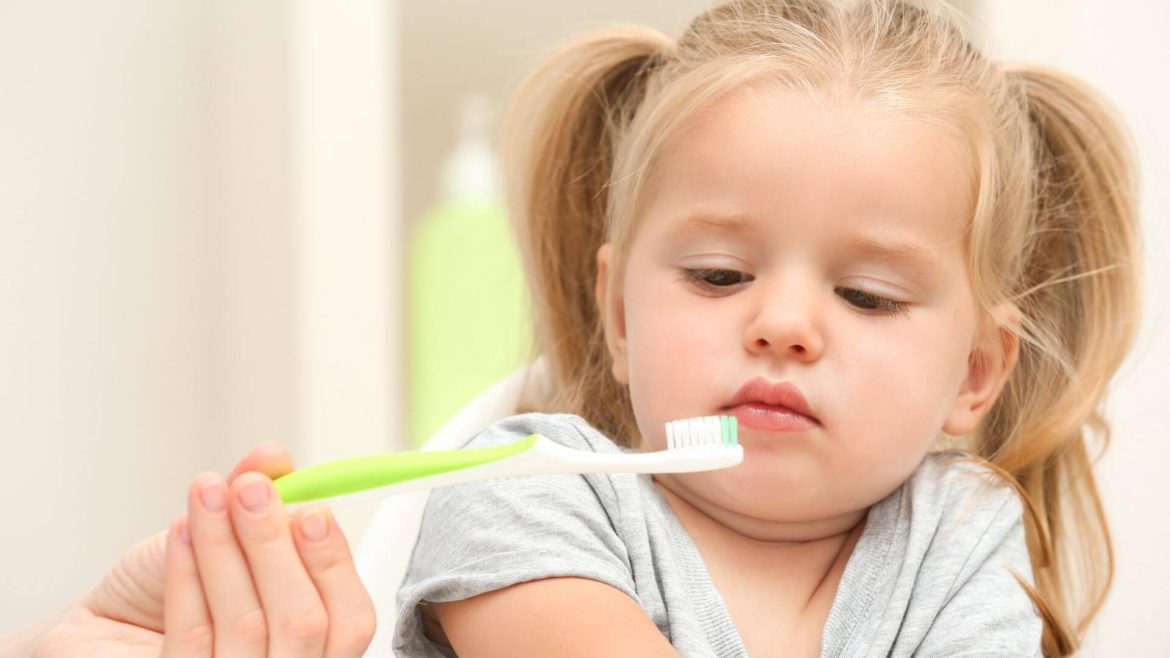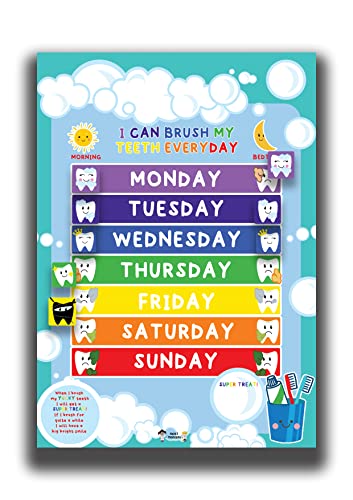You’re battling your toddler again, aren’t you? It’s teeth-brushing time, and they’re resisting. Don’t fret! This is a common struggle tied to their developmental stage. There are certain steps you must follow when a toddler doesn’t like brushing teeth.
But you can’t afford to lose; cavities can start with their first tooth. As their primary defense, you need effective strategies to turn this chore into a fun routine.
Let’s unravel this dental dilemma and equip you with the essential tools to win this fight.
Key Takeaways
- Toddler resistance to tooth brushing is common and can be caused by discomfort from brush bristles, dislike of toothpaste taste, fear of the unknown, and a desire for independence.
- Early dental hygiene is important for preventing tooth decay, gum disease, and cavities, and can have a significant impact on overall health, speech development, and self-esteem.
- Modeling good dental habits and making dental care a routine practice can help establish lifelong oral care habits.
- Choosing the right toothbrush for your toddler, such as one that is easy to hold, has soft bristles, and features their favorite color or character, can make brushing more enjoyable for them.
Understanding Toddlers’ Dental Care
During your toddler’s early years, it’s crucial for you to understand the importance of their dental care routine, even when they resist brushing their teeth. At this tender age, they’re developing primary teeth, which are vital for chewing, and speech development, and setting the stage for permanent teeth.
Understanding the intricacies of toddlers’ dental care requires knowledge of their unique needs.
- Their teeth and gums are delicate, necessitating gentle care. Use a soft-bristled toothbrush with a small head and non-fluoride toothpaste until they’re capable of spitting it out, usually around age three.
- Be aware of the risk of tooth decay, even in these early teeth. The American Academy of Pediatric Dentistry reports that cavities are the most common disease in children. Regular brushing, limited sugary drinks and snacks, and early dental visits can help prevent this.
Common Reasons Behind Toddlers’ Resistance from Tooth Brushing
As you navigate your toddler’s dental care journey, you might encounter resistance when it’s time for brushing their teeth. This resistance can arise from various reasons, which are important to understand so you can effectively address them.
- Toddlers may resist due to discomfort. The sensation of the brush bristles against their gums can be unpleasant, especially if they’re teething.
- They mightn’t like the taste of the toothpaste. Trying different flavors could help.
- Fear of the unknown is another common reason. Toddlers, with their limited experience, may find the brushing process intimidating. Demonstrating the process and making it a fun activity can help alleviate their fear.
- It’s essential to consider the independence aspect. Toddlers are at a stage where they’re learning to assert their autonomy. They may view toothbrushing as an infringement on their newfound independence. Giving them some control, like letting them hold the brush, can help.
Understanding these reasons is your first step towards overcoming your toddler’s resistance to tooth brushing. By doing so, you’re helping to establish good oral hygiene habits that will benefit their dental health in the long run.
RELATED ARTICLE: How to Deal With Hair Washing Tantrums
The Importance of Early Dental Hygiene
You’ve got to grasp the significance of early dental hygiene, especially when dealing with your toddler’s resistance to tooth brushing. This isn’t just about aesthetics or fresh breath. It’s about setting your child on a path to lifelong health.
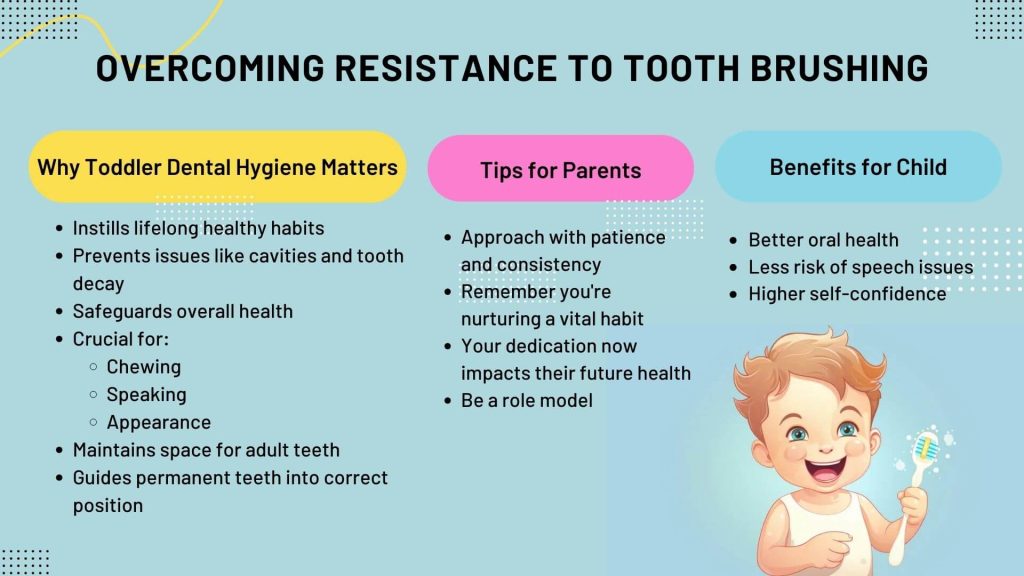
Early dental hygiene plays a pivotal role in preventing issues such as tooth decay, gum disease, and cavities. By instilling good oral care habits from an early age, you’re helping to safeguard your child’s overall health.
Dental problems in young children can:
- exacerbate health problems,
- impede speech development,
- and even affect self-esteem.
Remember, your toddler’s baby teeth are more than just placeholders for adult teeth. They’re crucial for chewing, speaking, and appearance. Moreover, they maintain the space for their permanent counterparts and guide them into the correct position.
So, it’s essential to approach your toddler’s resistance to tooth brushing with patience and consistency. You’re not just battling a nightly chore; you’re nurturing a crucial habit. Keep in mind that your dedication to their dental hygiene today will significantly impact their health tomorrow.
Mastering this task may be challenging, but the benefits for your child are well worth it.
Modeling Good Dental Habits
The next step in overcoming your toddler’s tooth-brushing resistance is to lead by example and demonstrate good dental habits. Remember, you’re the role model your child looks up to. If they see you brushing and flossing regularly, it’s likely they’ll want to mirror your actions.
- Make dental care a family affair.
- Get everyone involved and turn it into a routine practice.
- Show your toddler how you brush each tooth, use mouthwash, and floss.
- Explain the importance of each step in easy-to-understand terms.
- Use this as a bonding moment, fostering a positive association with dental hygiene.
Be consistent with your dental habits. Brush and floss at the same time each day, so your toddler recognizes it as a part of daily life. You can even humor them by exaggerating your enjoyment during brushing. This might make them more eager to participate.
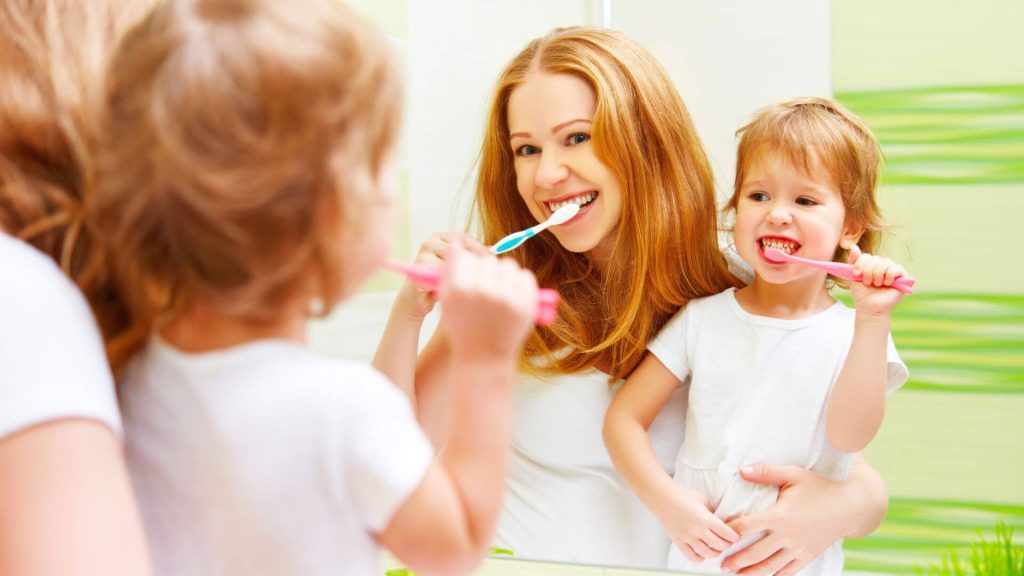
Also, take your child to regular dental check-ups. Let them observe as the dentist praises your good dental health. This reinforces the benefits of maintaining good oral hygiene and could make them more inclined to brush their teeth.
Above all, be patient. Developing good habits takes time, but with persistence, your child will eventually embrace tooth brushing.
RELATED ARTICLE: Why Did My Toddler Lose His Appetite?
Choosing the Right Toothbrush for Your Toddler
While it’s essential to model good dental habits, it’s equally important to select the right toothbrush for your toddler to make tooth brushing an enjoyable process. The perfect toothbrush for a toddler would be one that’s easy to hold, has soft bristles, and a small brush head to fit their tiny mouth.
- When you’re shopping for your toddler’s toothbrush, keep in mind that it should be appropriate for their age. Most manufacturers label their products with an age recommendation to help you out.
- Consider a toothbrush with a thick handle or one with grips. This makes it easier for your toddler’s small hands to hold and maneuver.
- The bristles should be soft to avoid damaging your toddler’s tender gums and emerging teeth.
- A small brush head is crucial as it can comfortably reach all areas of your toddler’s mouth.
- Involving your toddler in the selection process can be beneficial.
Let them choose a toothbrush featuring their favorite color or character. This can add an element of fun and encourage them to look forward to brushing their teeth.
Making Brushing Fun and Engaging
In brushing your toddler’s teeth, it’s crucial to incorporate elements of fun and engagement to foster a positive attitude toward this daily routine. You’re not just cleaning their teeth; you’re building habits that will serve them for a lifetime.
1- A fun toothbrush
Consider using a toothbrush that plays a song for two minutes – the recommended brushing time.
2. Choosing a toothpaste
Find toothpaste in your toddler’s favorite flavor.
3. It should be fun
Make it a family activity, showing your child that everyone brushes their teeth.
4. Reward
You can even create a rewards chart, giving them a sense of achievement each time they complete a brushing.
I remember we used to use Oral B app with my daughters favorite character Rapunzel. It is a timer with nice illustrations showing kids how long they should wash their teeth.
Disney Magic Timer by Oral-B
Still, it’s not just about making it fun. It’s about engagement.
- Explain to your child why brushing is important for their teeth and overall health.
- Use simple, age-appropriate language and visuals to help them understand.
- You could even turn it into a story or game, like fighting off the ‘sugar bugs’ that cause cavities.
Best Time for Brushing Toddler Teeth
Now, you might be wondering about the ideal time to brush your toddler’s teeth, especially after incorporating fun and engaging elements into the routine. Understanding the best timing can indeed make a significant difference in the effectiveness of the activity.
The American Dental Association recommends brushing at least twice a day: once after breakfast and again before bedtime. The morning brushing eliminates the bacteria that have accumulated overnight, while the evening brushing removes the day’s build-up and reduces the risk of tooth decay.
However, keep in mind the ‘wait to brush’ rule after meals. If your child has consumed anything acidic, it’s best to wait at least 30 minutes before brushing. Acidic foods and drinks can soften tooth enamel, and brushing too soon can cause it to wear away.
How to Handle Toothpaste Dislikes
Dealing with a toddler who dislikes toothpaste can be a tough challenge, but there are strategies you can use to help them overcome this aversion.
- To start, try different toothpaste flavors. Most brands offer a variety of options, from fruity to minty. Letting your child choose their flavor can be empowering and help pique their interest in brushing.
- If your toddler still resists, consider starting with a toothpaste-free toothbrush. This way, they’ll learn that brushing isn’t a battle, just a part of their daily routine. Gradually add a smidge of toothpaste and increase the amount as they get more comfortable.
- Another approach is to make brushing fun. Create a game around it or sing a special brushing song. You could also let your toddler watch you brush your teeth to show them it’s not scary but a normal part of grown-up life.
- Positive reinforcement works wonders. Praise your toddler when they brush their teeth, even if they only do it for a short time. Over time, they’ll associate tooth brushing with positive feedback, which can help them overcome their toothpaste dislike. Be patient. Rome wasn’t built in a day, and your toddler’s toothpaste aversion won’t disappear overnight.
Dealing With Toddler Brushing Battles
Even after you’ve tackled their toothpaste dislikes, your toddler might still put up a fuss when it’s time to brush their teeth. It’s a common struggle that many parents face. But don’t despair, you can turn these brushing battles into a more enjoyable experience.
- Consistency is key.
Make sure brushing is part of their daily routine, ideally in the morning and before bed. You can use visual aids like charts or timers to make it fun.
- Lead by example
Show them how you brush your teeth, emphasizing the importance of dental hygiene. This can help inculcate a sense of responsibility towards their own oral health.
- Let them have some control
Allow them to choose their toothbrush or the flavor of their toothpaste. This gives them a sense of ownership over the process and can reduce resistance.
- Use positive reinforcement
Praise them when they do a good job and consider small rewards for consistent brushing.
RELATED ARTICLE: When Should My Toddler Know All The Colors?
Professional Tips for Easing the Process
With these struggles in mind, you’ll find that professional advice can often provide effective strategies to make the tooth-brushing process easier for your toddler.
- American Dental Association: Make a game out of it
Create your own tooth care tale to delight your child while they brush. Make them the superhero who brushes away the bad guys that cause cavities or saves the world by giving everyone a healthier smile.
American Dental Association
- Better Health Channel: You can use 2 toothbrushes!
Try using two toothbrushes. One for them to hold and use and one for you to brush properly. Other children respond to ‘your turn, my turn’, where the child brushes first then the parent brushes.
Better Health Channel
- NoPo Kids Destirty – Screen time as a last resort
I am not always a big advocate for more screen time, but parents of older kids often use tooth brushing and flossing as a way for kids to earn screen time. Give it a try?!
Doctor Staci and the NoPo Kids Team
Pediatric dentists have a wealth of knowledge and experience dealing with toddlers’ dental hygiene issues, and they’re eager to share their insights with you.
Progress and Rewards in Dental Care
So, how can you ensure that your toddler sees progress and feels rewarded in their dental care journey? Begin by setting simple, achievable goals. For instance, brushing for two full minutes or correctly using dental floss. These small victories can help build their confidence and motivate them to continue with their dental care routines.
To track progress, consider using a chart where your child can place stickers each time they complete their daily dental tasks. This visual representation of their efforts can make the process more tangible and exciting for them.
Rewards play a crucial part in your child’s dental care journey. However, it’s important to avoid sugary treats as rewards, as they can counteract the efforts made in dental care. Instead, opt for non-food rewards such as a new book, a fun outing, or extra playtime.
Remember to praise your toddler for their efforts. Positive reinforcement not only boosts their morale but also instills in them the importance of maintaining good oral hygiene. It’s a journey that requires patience and consistency, but with the right approach, your toddler will eventually look forward to brushing their teeth.
Conclusion
It’s completely normal for toddlers to resist brushing their teeth. With their delicate teeth and gums, limited experience, and a growing sense of independence, it’s understandable why they may not like having a toothbrush shoved in their mouth.
As frustrating as it can be, remember that building good dental care habits now will pay lifelong dividends for your toddler’s health and happiness. With patience, creativity, and consistency on your part, you can turn brushing battles into bonding time.
The key is not to force it, but rather gently guide them towards embracing oral hygiene. With your support, even the most resistant toddler can become an enthusiastic brusher. This may require some out-of-the-box thinking, but the payoff – their beautiful, healthy smile – makes it all worthwhile.
Hope I covered all your questions and doubts on why your toddler doesn’t like brushing teeth and how to handle it. Let me know in the comments what methods are you using. I would love to hear!
Want to save this article for later?
Pin it!
